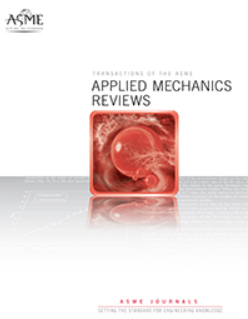Dynamic Analysis of a Timoshenko–Ehrenfest Single-Walled Carbon Nanotube in the Presence of Surface Effects: The Truncated Theory
IF 16.1
1区 工程技术
Q1 MECHANICS
引用次数: 0
Abstract
The main objective of this paper is to study the free vibration of a Timoshenko–Ehrenfest single-walled carbon nanotube based on the nonlocal theory and taking surface effects into account. To model these effects on frequency response of nanotubes, we use Eringen’s nonlocal elastic theory and surface elastic theory proposed by Gurtin and Murdoch to modify the governing equation. A modified version of Timoshenko nonlocal elasticity theory—known as the nonlocal truncated Timoshenko beam theory—is put forth to investigate the free vibration behavior of single-walled carbon nanotubes (SWCNTs). Using Hamilton’s principle, the governing equations and the corresponding boundary conditions are derived. Finally, to check the accuracy and validity of the proposed method, some numerical examples are carried out. The impacts of the nonlocal coefficient, surface effects, and nanotube length on the free vibration of single-walled carbon nanotubes (SWCNTs) are evaluated, and the results are compared with those found in the literature. The findings indicate that the length of the nanotube, the nonlocal parameter, and the surface effect all play important roles and should not be disregarded in the vibrational analysis of nanotubes. Finally, the results show how effective and successful the current formulation is at explaining the behavior of nanobeams.表面效应下Timoshenko-Ehrenfest单壁碳纳米管的动力学分析:截断理论
本文的主要目的是基于非局域理论,考虑表面效应,研究Timoshenko-Ehrenfest单壁碳纳米管的自由振动。为了模拟这些对纳米管频率响应的影响,我们使用Eringen的非局部弹性理论和Gurtin和Murdoch提出的表面弹性理论来修改控制方程。提出了一种改进的Timoshenko非局部弹性理论,即非局部截断Timoshenko梁理论,用于研究单壁碳纳米管(SWCNTs)的自由振动行为。利用哈密顿原理,导出了控制方程和相应的边界条件。最后,通过算例验证了所提方法的准确性和有效性。评估了非局部系数、表面效应和纳米管长度对单壁碳纳米管(SWCNTs)自由振动的影响,并将结果与文献结果进行了比较。研究结果表明,纳米管的长度、非局部参数和表面效应在纳米管的振动分析中都起着重要的作用,不可忽视。最后,结果表明,目前的公式是如何有效和成功地解释纳米梁的行为。
本文章由计算机程序翻译,如有差异,请以英文原文为准。
求助全文
约1分钟内获得全文
求助全文
来源期刊
CiteScore
28.20
自引率
0.70%
发文量
13
审稿时长
>12 weeks
期刊介绍:
Applied Mechanics Reviews (AMR) is an international review journal that serves as a premier venue for dissemination of material across all subdisciplines of applied mechanics and engineering science, including fluid and solid mechanics, heat transfer, dynamics and vibration, and applications.AMR provides an archival repository for state-of-the-art and retrospective survey articles and reviews of research areas and curricular developments. The journal invites commentary on research and education policy in different countries. The journal also invites original tutorial and educational material in applied mechanics targeting non-specialist audiences, including undergraduate and K-12 students.

 求助内容:
求助内容: 应助结果提醒方式:
应助结果提醒方式:


